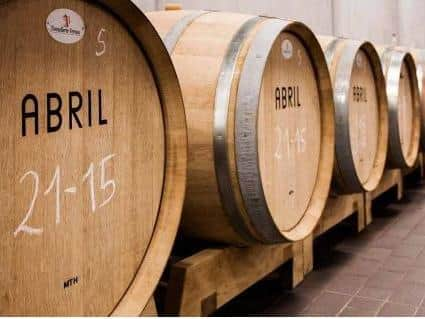Tom Jones of the Whalley Wine Shop explains what you need to know about vegan wines
and live on Freeview channel 276
To be called a ‘wine’, the only product allowed to be used as the base is the juice from grapes (small exceptions exist for ‘fruit wines’ like damson and elderflower, but these will always say that on the label). However, during the process of making the wine several things are allowed to be added, the most common and obvious being sugar and yeast, needed for the fermentation process.
What makes a wine non-vegan is the addition of a few ingredients that are often used as ‘fining agents’. Before a wine is complete it’s often cloudy with tiny particles of grape pulp and skin. Most customers don’t want a cloudy wine (though this is changing slightly) so a process of ‘fining and filtration’ is undertaken. ‘Fining’ is the addition of substances (often animal products) to make the tiny particles clog together so they’re big enough to be filtered. They do not remain as part of the wine, but the use of these animal products is enough to make the wine non-vegan.
Advertisement
Hide AdAdvertisement
Hide AdThere are three main culprits – gelatin, albumin and casein. Gelatin was often used to fine out wines, especially those with excess tannins, but is becoming much rarer. The albumin in egg whites can also play a crucial role as a fining agent in fine wine production, especially Burgundy, where it will absorb harsh and bitter tannins and leave behind the softer more desirable ones. Casein is a protein from milk and when used in a salt form (sodium caseinate) is another non-vegan fining agent.


Finally the use of Isinglass, a protein obtained from the dried bladders of sturgeon and other freshwater fish, has been used since 1660. It is added as a powder or liquid and was historically used instead of gelatin and very popular in the beer industry. It’s important to stress none of these products are harmful to humans or affect the flavour (unless used improperly), but their use in the production stage does make wine non-vegan.
However, many producers are moving away from these older methods and, in response to the demand for vegan-friendly wines, have sought out new alternatives, such as Bentonite Clay. As a result we now have dozens of vegan wines available in the shop, and this month will be highlighting those with ‘vegan’ neck collars. We have also produced a six-bottle mixed vegan case for just £60, including:
Sacchetto ‘Fili’ Extra Dry Prosecco – Veneto, Italy, 11.5%, NV. £13.99 a bottle
Advertisement
Hide AdAdvertisement
Hide AdThis high quality prosecco is beautifully presented in a skittle-shaped bottle and has long been a shop favourite. Lovely soft citrus notes combine with some gentle fruit and a delicate fizz. ‘Extra dry’ is somewhat misleading, as it is slightly softer and fruitier than the ‘Brut’ classification. Makes an ideal aperitif or great with tempura vegetables.


San Marzano ‘Talo’ Verdeca – Puglia, Italy, 12.5%, 2019. £11.49 a bottle
This relatively unknown grape variety has been a bit of a revelation for us. Ideal for people who drink Pinot Grigio but maybe want to explore something new and with a bit more character. This lovely dry white shows notes of aromatic white flowers, crisp green apple and a soft hint of honey. Soft flavour, rounded texture and a crisp refreshing finish. Superb with an Italian herb salad.
Herdade do Rocim ‘Mariana’ Red – Alentejo, Portugal, 14%, 2019. £9.99 a bottle
Advertisement
Hide AdAdvertisement
Hide AdProduced organically in one of the most exciting Portuguese wine regions and manually harvested to reduce emissions, this is a blend of native grapes Touriga Nacional (40%), Aragonez (30%), Alicante Bouschet (20%) and Trincadeira (10%) and is fermented using ‘Indigenous yeasts’ – those found naturally in the vineyard. A rich blend of juicy cooked berry fruit with some nice spice, a rich and rounded mouthfeel, good soft tannins and a very subtle hint of toasty oak in the finish.
Well-rounded, and perfect for a rich tomato-based curry.
This relatively unknown grape variety has been a bit of a revelation for us
Madeira toast
This week I was lucky enough to try a wine from 1907 – 113 years old!
It was from a bottle of Madeira, the tiny Portuguese island off the coast of Africa. Historically an incredibly important trading port and wine producing region, the American declaration of independence was toasted with Madeira!
Advertisement
Hide AdAdvertisement
Hide AdThe distinctive wines got their character from being heated on long sea journeys and made them incredibly durable and long lived. It has resulted in these fabulous old bottles still being available and still being in good condition.
Honestly, I urge you to try some old Madeira if you ever get the chance, you won’t be disappointed!
Comment Guidelines
National World encourages reader discussion on our stories. User feedback, insights and back-and-forth exchanges add a rich layer of context to reporting. Please review our Community Guidelines before commenting.